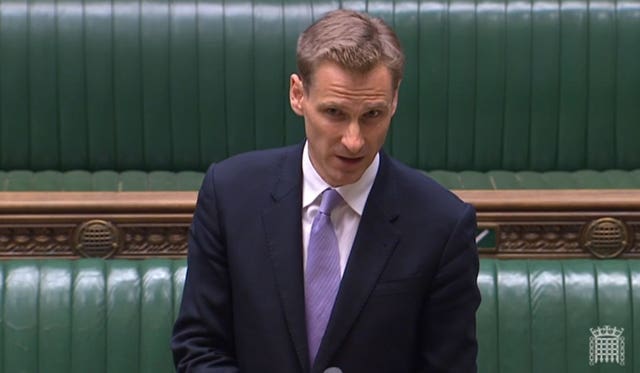
Vanessa Feltz 3pm - 6pm
30 May 2022, 13:04

Chris Philp has said that for the Government ‘safety is paramount’ when it comes to nuclear power generation.
Business Secretary Kwasi Kwarteng is considering extending the life of the Hinkley Point B plant but only if the nuclear power station complies with “safety certification”, a culture minister has suggested.
Appearing on Times Radio, Chris Philp was asked about reports that ministers have been warned of potential power cuts to as many as six million households this winter, with the Government drawing up plans for rationed electricity if supply issues deteriorate.
Last month, Mr Kwarteng wrote to the owners of the UK’s remaining coal-fired power stations to ask them to stay open longer than planned, and Hinkley Point B, a nuclear power station in Somerset, could also be given an extension.
Mr Philp described the Business Secretary’s actions as “sensible” and “precautionary” and when asked about the risks of keeping Hinkley Point B open, the culture minister stressed that for the Government “safety is paramount”.
He said no extension to the life of any power station in the UK would take place “unless the safety certification had been done in a very thorough way”.
It was announced that Hinkley Point B power station was to move into decommissioning within the next two years in November 2020.
EDF said Hinkley Point B power station in Somerset would have been moved into the defueling phase no later than July 2022.
Hinkley Point B started generating electricity in 1976 and since then has produced more than 300 terawatt hours of power – an amount of energy that would meet the electricity requirements of every home in the UK for three years.
Mr Philp told Times Radio: “I think what the Business Secretary Kwasi Kwarteng did last week was take some sensible precautionary measures to guard against a potential worst-case scenario.
“He asked, I think, the three remaining coal-fired power station operators to just keep their power stations available beyond the point of which they were due to be switched off, and I think he is considering whether Hinkley B, the large nuclear power station, might continue beyond its planned end of life as well.

“That’s a sensible precautionary measure, given that gas supply coming out of Russia and Ukraine is, for obvious reasons, so heavily disrupted and we do, of course, use quite a lot of gas to generate electricity.
“Only a very small proportion of that, of course, comes from Russia. A lot of ours comes from Norway and in the form of liquefied natural gas but, of course, disruption to the global gas market will have a knock-on effect that may affect the gas that we consumed domestically in the United Kingdom.
“So, I think these are just sensible precautionary measures, just to guard against a potential worst-case scenario.”
When asked about the risks and if the Government has any concerns about Hinkley Point B, given “it is nearly 50 years old”, Mr Philp said: “Well, obviously when it comes to nuclear power generation, or indeed any power generation, safety is paramount.
“So, no extension to the life of any power station in the UK, least of all a nuclear one, would take place unless the safety certification had been done in a very thorough way.
“We are very fortunate in the United Kingdom to have an incredibly good safety track record around our nuclear power stations that have been running now for, I think, 60 or so, more than that, probably 70 or so years now.
“We obviously have no intention at all of diluting or reducing those world-leading and incredibly high safety standards.”
According to The Times, Government modelling of a “reasonable” worst-case scenario predicts major gas shortages in winter if Russia cuts off more supplies to the EU.
As a result, six million homes could see their electricity rationed, primarily during morning and evening peaks, in curbs that may last more than a month.
Worse modelling is reported for a scenario in which Russia cuts off all supplies to the EU.
A Government spokesperson told the PA news agency the request for the power stations in Drax, Ratcliffe and West Burton, which were due to shut in September, to stay open was made “in light” of the Russian invasion of Ukraine.
“It is only right that we explore a wide range of options to further bolster our energy security and domestic supply – bringing down costs in the long term,” the spokesperson said.
“While there is no shortage of supply, we may need to make our remaining coal-fired power stations available to provide additional back-up electricity this coming winter if needed.
“It remains our firm commitment to end the use of coal power by October 2024.”
A Number 10 spokesman downplayed fears of power cuts and energy rationing.
He said: “I think you would expect Government to look at a range of scenarios to ensure plans are robust, no matter how unlikely they are to pass. Neither the Government or National Grid expect power cuts this winter.
“You will know that we are in a fortunate position, we are not dependent on Russian energy imports and have one of the most reliable and diverse energy systems.”